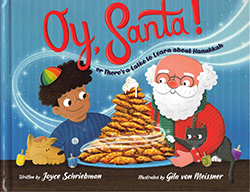Oy, Santa by Joyce Schriebman, with illustrations by Gila von Meissner; Seattle, Washington: Intergalactic Afikoman (c) 2024; ISBN 9781951-365226l; 36 pages; $19.99.

 SAN DIEGO — I had mixed feelings about this book, intended for children aged 4 through 8.
SAN DIEGO — I had mixed feelings about this book, intended for children aged 4 through 8.
While its main thrust is to explain the history and customs of Hanukkah, it also draws Jewish children into the myth of Santa Claus.
Oliver, the son of an interracial Jewish marriage, writes to Santa, telling Santa that he and his reindeer don’t have to visit Oliver’s house because he’s a Jewish boy. Santa responds that he keeps track of children everywhere, including him and his friend Ibrahim, which of course is a typical Muslim name. In passing, Santa wishes Oliver a “Happy Chrismukkah!” which draws a rebuke from Oliver who says Hanukkah is a separate holiday, “which happened way before Christmas when some king said we couldn’t be Jews anymore…”
Santa responds that he knows that Christmas and Hanukkah are different, and in fact “not all elves celebrate Christmas. Goldie, Morris. Shazia. They all get time off from the toy shop to attend synagogues and mosques for their holidays.” Santa’s closing salutation is “Enjoy your matzah,” prompting Oliver once again to correct Santa, saying that matzahs are for Passover; jelly donuts and latkes are the special treats of Hanukkah. Santa responds that he really likes his latkes with ketchup. “Oy, Santa,” responds Oliver, latkes are meant to be eaten with applesauce or sour cream. Santa responds that latkes are made from potatoes, and “people put ketchup on French fries, right?”
And on the conversation goes for several more exchanges.
The possible drawback of this book is that Jewish parents, like Christian parents, someday will have to explain that Santa Claus is not real, disappointing their children.
On the other hand, in the U.S., Jewish children grow up with Christmas songs, Christmas TV shows, and Christmas decorations all around them, so they are exposed to the Santa myth anyway. This book will help children, especially those growing up in interfaith families, to differentiate the two holidays which typically abut each other in December. In fact, this year, Hanukkah beings the evening of December 25th (Christmas Day) and ends at sunset January 2, 2025.
This book may be to teach Jewish children that it’s okay to know about other religions, respecting their practitioners, while all the while hewing to Judaism.
*
Donald H. Harrison is publisher and editor of San Diego Jewish World.